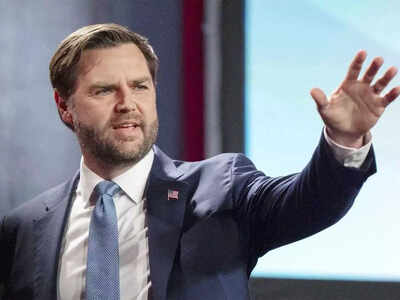JD Vance has taken on the traditionally subdued role of US Vice President with an unusually aggressive posture, stepping far beyond the ceremonial expectations of the office in his first 100 days. At just 40, the former Ohio senator has inserted himself into world affairs in ways few of his predecessors dared, quickly becoming the public face of President Donald Trump’s most controversial foreign policy stances.
“Vance is unfailingly loyal to the president, knows not to overshadow the boss, and acts as an attack dog,” said Matt Dallek, a professor of political management at George Washington University. “But he also makes in-your-face comments that represent something of a departure from his predecessors.”
Oval Office firestorm: The Zelensky confrontation
Vance’s global profile exploded in February when he confronted Ukrainian President Volodymyr Zelensky in the Oval Office. As tensions simmered over continued US aid to Ukraine, Vance accused Zelensky of being ungrateful.
“Have you said ‘thank you’ once, this entire meeting?” Vance demanded, calling the Ukrainian leader “disrespectful.” The moment quickly escalated as President Trump joined in, berating Zelensky in front of reporters.

Vance later denied that the exchange was part of any coordinated plan to play “bad cop,” but the spectacle cemented his position as Trump’s ideological bulldog on foreign policy.
Who is JD Vance? A man of many masks
Since taking office, there has been speculation over which version of Vance would show up in Washington. Was he the Appalachian chronicler of Hillbilly Elegy, the Marine Corps veteran, the Yale Law School graduate, the Catholic convert, or the Silicon Valley investor?
At one point, he was also a staunch Trump critic, comparing the former president to Adolf Hitler. But since entering politics, Vance has undergone a sharp transformation, aligning himself completely with Trump’s agenda and presenting himself as the ultimate MAGA loyalist.

Culture warrior abroad: Europe gets an earful
Vance’s first major foreign appearance came at the Munich Security Conference, where he delivered a strident address targeting what he described as Europe’s “woke” culture and overreliance on US defense.
“There’s a new sheriff in town,” he told startled allies, signaling that America’s foreign policy would now take a more confrontational and transactional turn under the second Trump administration.
Signalgate: A slip that showed Vance’s true views
In a moment that revealed more than intended, a journalist was accidentally added to a Signal group chat discussing US airstrikes on Yemen’s Huthi rebels. In the conversation, Vance lamented, “I just hate bailing out Europe again,” criticizing US military involvement that he argued disproportionately benefits the EU.
The leak, dubbed “Signalgate,” showed the vice president’s skepticism of traditional alliances and his preference for a nationalist, America-first approach.
Mission Greenland: Backing Trump’s Territorial Ambition
Adding fuel to another long-standing Trump fascination, Vance visited Greenland to lend credence to the president’s renewed interest in purchasing the Danish-ruled territory. The trip was condemned as provocative by Denmark and NATO officials, but Vance defended it unapologetically.
“We can’t just ignore the president’s desires,” he said during the trip, framing the visit as a gesture of loyalty to Trump’s geopolitical instincts.

His wife, Usha Vance, made a rare public appearance during the visit, offering a glimpse into the personal toll of Vance’s high-profile role. “It’s a very lonely, lonely world,” she admitted in an interview, reflecting on the pressure and isolation that comes with the job.
Clashing with China: Peasants comment sparks outrage
Vance has also drawn fire from Beijing for controversial comments about America’s debt dependence. In a speech, he claimed the US was “borrowing money from Chinese peasants,” a remark that triggered an official rebuke from China’s Foreign Ministry.
The Cheney comparison—and 2028 ambitions
Comparisons between Vance and former Vice President Dick Cheney are increasingly common. Like Cheney, who shaped George W. Bush’s foreign policy and championed the Iraq War, Vance is viewed as a central player in the Trump administration’s international strategy—particularly in pushing back against aid to Ukraine and resisting new US military engagements.
Speculation is already swirling about Vance’s political future. He has not ruled out a 2028 presidential run but insists he would only move forward after consulting Trump.
Trump, however, hasn’t endorsed the idea. “No,” the president told Fox News’s Bret Baier in February when asked if Vance was his chosen successor. “But he’s very capable.”
The unconventional vice president
In just three months, JD Vance has proven he is no placeholder. From confrontations with world leaders to unapologetic defenses of Trump’s most polarizing ideas, Vance is not only redefining the role of vice president—he’s auditioning for something bigger.
Whether the world is ready for that remains to be seen. But one thing is clear: JD Vance is not here to wait in the wings.


